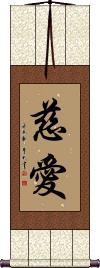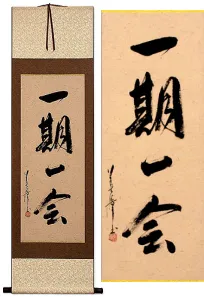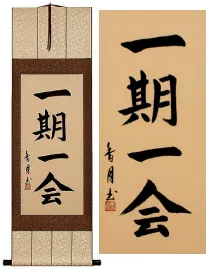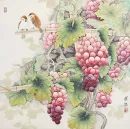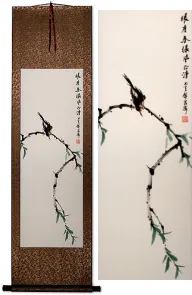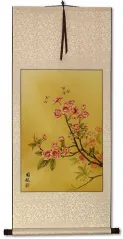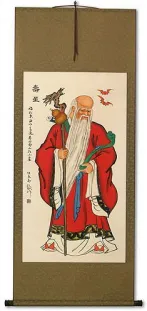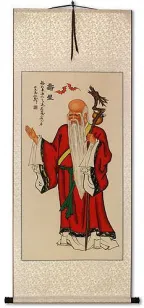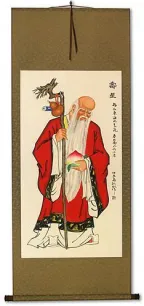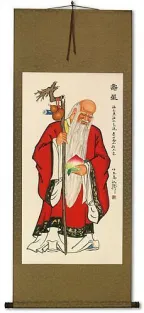Many custom options...
And formats...

Not what you want?
Try other similar-meaning words, fewer words, or just one word.
Loved One in Chinese / Japanese...
Buy a Loved One calligraphy wall scroll here!
Personalize your custom “Loved One” project by clicking the button next to your favorite “Loved One” title below...
Carry On, Undaunted
前赴後繼 is a Chinese proverb that figuratively means “to advance dauntlessly in wave upon wave.”
It suggests that you should or can carry on and have the strength to keep going.
While this proverb is a little bit militaristic, it suggests that despite a fallen comrade (or perhaps a loved one), you should keep going and work towards the goal they intended.
The Pain of Separation from Your Loves
愛別離苦 is a Buddhist term that refers to “the pain of separation from loved ones,” or “the suffering of being separated from those whom one loves.”
If you translate each character separately, you get, “love(s) separated [and] departed [yields] pain.”
The pain character can also be defined as anguish; suffering; distress; anxiety; worry; trouble; difficulty; hardship; bitterness; to suffer; anguish; distress; anxiety; worry; trouble; difficulty; bitterness; unhappiness; or misery.
Love and Devotion
慈愛 refers to the kind of love and devotion you might have to your children or any loved one.
This especially applied to your children but could also be any member of your family - spouse, etc.
This can also be translated as affection, kindness, love, to love affectionately.
慈愛 is also used in a Buddhist context with the same meaning.
In Japanese, this can also be a female given name romanized as Yasue.
Broken Mirror Rejoined
Used in modern times for divorced couples that come back together
破鏡重圓 is about a husband and wife who were separated and reunited.
About 1500 years ago in China, there lived a beautiful princess named Le Chang. She and her husband Xu De Yan loved each other very much. But when the army of the Sui Dynasty was about to attack their kingdom, disposed of all of their worldly possessions and prepared to flee into exile.
They knew that in the chaos, they might lose track of each other, so the one possession they kept was a bronze mirror which is a symbol of unity for a husband and wife. They broke the mirror into two pieces, and each of them kept half of the mirror. They decided that if separated, they would try to meet at the fair during the 15th day of the first lunar month (which is the lantern festival). Unfortunately, the occupation was brutal, and the princess was forced to become the mistress of the new commissioner of the territory, Yang Su.
At the Lantern Festival the next year, the husband came to the fair to search for his wife. He carried with him his half of the mirror. As he walked through the fair, he saw the other half of the mirror for sale at a junk market by a servant of the commissioner. The husband recognized his wife's half of the mirror immediately, and tears rolled down his face as he was told by the servant about the bitter and loveless life that the princess had endured.
As his tears dripped onto the mirror, the husband scratched a poem into his wife's half of the mirror:
You left me with the severed mirror,
The mirror has returned, but absent are you,
As I gaze in the mirror, I seek your face,
I see the moon, but as for you, I see not a trace.
The servant brought the inscribed half of the mirror back to the princess. For many days, the princess could not stop crying when she found that her husband was alive and still loved her.
Commissioner Yang Su, becoming aware of this saga, realized that he could never obtain the princess's love. He sent for the husband and allowed them to reunite.
This proverb, 破鏡重圓, is now used to describe a couple who has been torn apart for some reason (usually divorce) but have come back together (or remarried).
It seems to be more common these days in America for divorced couples to reconcile and get married to each other again. This will be a great gift if you know someone who is about to remarry their ex.
This in-stock artwork might be what you are looking for, and ships right away...
Gallery Price: $72.00
Your Price: $39.88
Gallery Price: $61.00
Your Price: $33.88
Gallery Price: $340.00
Your Price: $188.77
Gallery Price: $200.00
Your Price: $122.88
Gallery Price: $108.00
Your Price: $59.88
Gallery Price: $61.00
Your Price: $33.88
Gallery Price: $61.00
Your Price: $33.88
Gallery Price: $61.00
Your Price: $33.88
Not the results for loved one that you were looking for?
Below are some entries from our dictionary that may match your loved one search...
| Characters If shown, 2nd row is Simp. Chinese |
Pronunciation Romanization |
Simple Dictionary Definition |
愛別離苦 爱别离苦 see styles |
ài bié lí kǔ ai4 bie2 li2 ku3 ai pieh li k`u ai pieh li ku aibetsuriku あいべつりく |
More info & calligraphy: The Pain of Separation from Your Loves(yoji) {Buddh} the pain of separation from loved ones The suffering of being separated from those whom one loves. v. 八苦. |
苦 see styles |
kǔ ku3 k`u ku ku く |
bitter; hardship; pain; to suffer; to bring suffering to; painstakingly (1) pain; anguish; suffering; distress; anxiety; worry; trouble; difficulty; hardship; (2) {Buddh} (See 八苦) duhkha (suffering) duḥkha, 豆佉 bitterness; unhappiness, suffering, pain, distress, misery; difficulty. There are lists of two, three, four, five, eight, and ten categories; the two are internal, i. e. physical and mental, and external, i. e. attacks from without. The four are birth, growing old, illness, and death. The eight are these four along with the pain of parting from the loved, of meeting with the hated, of failure in one's aims, and that caused by the five skandhas; cf. 四諦. |
八苦 see styles |
bā kǔ ba1 ku3 pa k`u pa ku hakku はっく |
the eight distresses - birth, age, sickness, death, parting with what we love, meeting with what we hate, unattained aims, and all the ills of the five skandhas (Buddhism) {Buddh} the eight kinds of suffering (birth, old age, disease, death, parting from loved ones, meeting disliked ones, not getting what one seeks, pains of the five skandha) The eight distresses―birth, age, sickness, death, parting with what we love, meeting with what we hate, unattained aims, and all the ills of the five skandhas. |
痛失 see styles |
tòng shī tong4 shi1 t`ung shih tung shih |
to suffer the painful loss of (a loved one etc); to miss out on (an opportunity); to fail to gain (victory etc) |
陪床 see styles |
péi chuáng pei2 chuang2 p`ei ch`uang pei chuang |
to look after a hospitalized loved one |
きゅん see styles |
kyun キュン |
(adv,adv-to) (onomatopoeic or mimetic word) choked up (with emotion); heart-wringing; momentary tightening of one's chest caused by powerful feelings (e.g. parting with a loved one); (personal name) Kuen |
反魂香 see styles |
hangonkou / hangonko はんごんこう |
incense which supposedly allows the spirit of a departed loved one to be seen in the smoke |
思い人 see styles |
omoibito おもいびと |
loved one; lover; sweetheart |
想い人 see styles |
omoibito おもいびと |
loved one; lover; sweetheart |
お世話様 see styles |
osewasama おせわさま |
(expression) thanks for taking care of me; thanks for taking care of my loved one |
四苦八苦 see styles |
sì kǔ bā kǔ si4 ku3 ba1 ku3 ssu k`u pa k`u ssu ku pa ku shikuhakku しくはっく |
(n,vs,vi) (1) (yoji) being in dire distress; being hard put to it; being hard pressed (for money); (2) (yoji) {Buddh} (See 四苦,八苦) the four and eight kinds of suffering (birth, old age, disease, death, parting from loved ones, meeting disliked ones, not getting what one seeks, pains of the five skandha) four and eight kinds of suffering |
後を追う see styles |
atooou / atooo あとをおう |
(exp,v5u) (1) to pursue; (2) to die right after a loved one; to kill oneself (because one misses or longs to be with a loved one); (3) to follow an example set by earlier generations (or one's master, etc.) |
御世話様 see styles |
osewasama おせわさま |
(expression) thanks for taking care of me; thanks for taking care of my loved one |
跡を追う see styles |
atooou / atooo あとをおう |
(exp,v5u) (1) to pursue; (2) to die right after a loved one; to kill oneself (because one misses or longs to be with a loved one); (3) to follow an example set by earlier generations (or one's master, etc.) |
お世話さま see styles |
osewasama おせわさま |
(expression) thanks for taking care of me; thanks for taking care of my loved one |
ラヴコール see styles |
rarakooru ラヴコール |
(1) love call; calling out to someone with love or good will; (2) phone call to a loved one; (3) fervent request; heartfelt appeal; passionate call to action |
ラブコール see styles |
rabukooru ラブコール |
(1) love call; calling out to someone with love or good will; (2) phone call to a loved one; (3) fervent request; heartfelt appeal; passionate call to action |
御世話さま see styles |
osewasama おせわさま |
(expression) thanks for taking care of me; thanks for taking care of my loved one |
ラヴ・コール see styles |
rara kooru ラヴ・コール |
(1) love call; calling out to someone with love or good will; (2) phone call to a loved one; (3) fervent request; heartfelt appeal; passionate call to action |
ラブ・コール see styles |
rabu kooru ラブ・コール |
(1) love call; calling out to someone with love or good will; (2) phone call to a loved one; (3) fervent request; heartfelt appeal; passionate call to action |
亡う(iK) see styles |
ushinau(gikun) うしなう(gikun) |
(transitive verb) (See 失う・うしなう・3) to lose (a loved one); to be bereaved of |
Variations: |
kyun; kyun きゅん; キュン |
(adv,adv-to) (onomatopoeic or mimetic word) (esp. 胸がきゅん(と)なる) with a pitter-patter; choked up (with emotion); heart-wringing; momentary tightening of one's chest caused by powerful feelings (e.g. parting with a loved one) |
Variations: |
omoibito おもいびと |
loved one; lover; sweetheart |
エンディングノート see styles |
endingunooto エンディングノート |
booklet constituting an informal living will (containing wishes regarding one's hospitalization or funeral, and perhaps one's life story, messages to loved ones, etc.) (wasei: ending note) |
エンディング・ノート see styles |
endingu nooto エンディング・ノート |
booklet constituting an informal living will (containing wishes regarding one's hospitalization or funeral, and perhaps one's life story, messages to loved ones, etc.) (wasei: ending note) |
Variations: |
ushinau うしなう |
(transitive verb) (1) to lose; (transitive verb) (2) to miss (a chance, opportunity); (transitive verb) (3) to lose (a loved one); to be bereaved of; (transitive verb) (4) to concede (goals, points, etc.) |
Variations: |
atooou / atooo あとをおう |
(exp,v5u) (1) to follow; to pursue; to chase; to run after; (exp,v5u) (2) to die right after a loved one; to kill oneself after the death of a loved one; (exp,v5u) (3) to follow an example set by earlier generations (or one's master, etc.) |
Variations: |
endingunooto; endingu nooto エンディングノート; エンディング・ノート |
booklet constituting an informal living will (containing wishes regarding one's hospitalization or funeral, and perhaps one's life story, messages to loved ones, etc.) (wasei: ending note) |
Variations: |
osewasama おせわさま |
(expression) thanks for taking care of me; thanks for taking care of my loved one |
Variations: |
rabukooru; rarakooru; rabu kooru; rara kooru ラブコール; ラヴコール; ラブ・コール; ラヴ・コール |
(1) calling out to someone with love or good will (wasei: love call); (2) phone call to a loved one; (3) fervent request; heartfelt appeal; passionate call to action |
Click here for more loved one results from our dictionary
The following table may be helpful for those studying Chinese or Japanese...
| Title | Characters | Romaji (Romanized Japanese) | Various forms of Romanized Chinese | |
| Carry On, Undaunted | 前赴後繼 前赴后继 | qián fù hòu jì qian2 fu4 hou4 ji4 qian fu hou ji qianfuhouji | ch`ien fu hou chi chienfuhouchi chien fu hou chi |
|
| The Pain of Separation from Your Loves | 愛別離苦 爱别离苦 | ai betsu ri ku aibetsuriku | ài bié lí kǔ ai4 bie2 li2 ku3 ai bie li ku aibieliku | ai pieh li k`u aipiehliku ai pieh li ku |
| Love and Devotion | 慈愛 慈爱 | jiai | cí ài / ci2 ai4 / ci ai / ciai | tz`u ai / tzuai / tzu ai |
| Broken Mirror Rejoined | 破鏡重圓 破镜重圆 | pò jìng chóng yuán po4 jing4 chong2 yuan2 po jing chong yuan pojingchongyuan | p`o ching ch`ung yüan pochingchungyüan po ching chung yüan |
|
| In some entries above you will see that characters have different versions above and below a line. In these cases, the characters above the line are Traditional Chinese, while the ones below are Simplified Chinese. | ||||
Successful Chinese Character and Japanese Kanji calligraphy searches within the last few hours...


